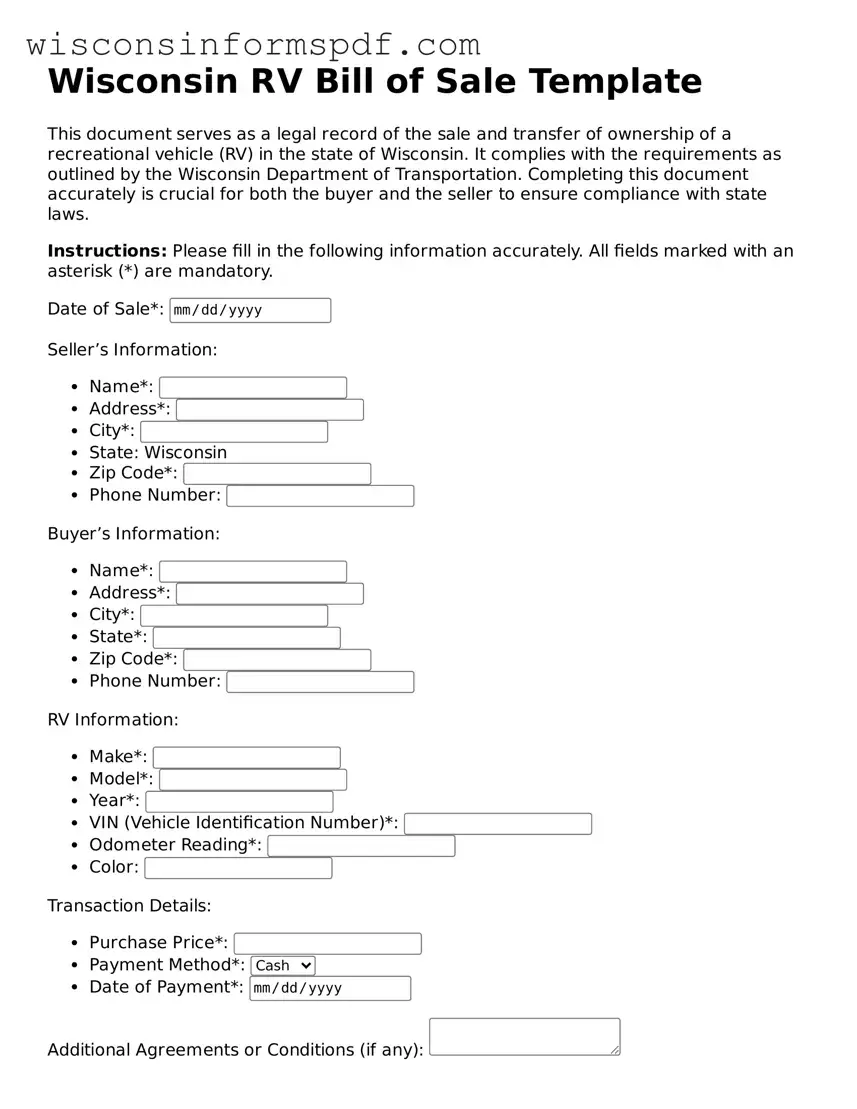What is the purpose of the Wisconsin RV Bill of Sale form?
The Wisconsin RV Bill of Sale form serves as a legal document to record the sale and purchase of a Recreational Vehicle (RV) within the state of Wisconsin. It provides essential information regarding the transaction, including details about the buyer, seller, and the RV itself. This form is instrumental in transferring ownership from the seller to the buyer and is required for the registration of the RV under the new owner's name.
Is the Wisconsin RV Bill of Sale form mandatory for all RV sales in Wisconsin?
Yes, in Wisconsin, it is a requirement to complete a Bill of Sale form when selling or buying an RV. This form acts as a proof of purchase and is necessary for legalizing the change of ownership. The Department of Motor Vehicles (DMV) in Wisconsin mandates this document for the registration and titling of the RV under the new owner’s name.
What information is required on the Wisconsin RV Bill of Sale form?
The form requires specific details to ensure a valid transaction. This includes information about the seller and buyer (names, addresses, contact details), and comprehensive details about the RV (make, model, year, VIN, and purchase price). Additionally, the sale date and signatures from both the buyer and seller are necessary to authenticate the document.
Do both the buyer and the seller need to sign the Wisconsin RV Bill of Sale form?
Yes, for the Wisconsin RV Bill of Sale form to be legally binding, both the seller and the buyer must provide their signatures. The sign-off by both parties confirms their agreement to the terms and conditions of the sale, including the transfer of ownership and the purchase price.
Where do I file the completed Wisconsin RV Bill of Sale form?
Once the Wisconsin RV Bill of Sale form is filled out and signed by both parties, it needs to be submitted to the Wisconsin Department of Motor Vehicles (DMV). This is a necessary step for the buyer to register the RV in their name. The DMV uses this form to verify the transaction and to update the ownership records accordingly.
Can the Wisconsin RV Bill of Sale form be used as legal proof in disputes?
Yes, the Wisconsin RV Bill of Sale form can serve as a crucial piece of evidence in legal disputes regarding the RV's ownership or the terms of the sale. Its details provide a clear transaction history, which can help resolve conflicts or claims concerning the RV's ownership.
What happens if the Wisconsin RV Bill of Sale form is not properly completed?
If the Wisconsin RV Bill of Sale form is not properly filled out, it may lead to complications in the selling or buying process. Incomplete or incorrect information can delay the ownership transfer and may prevent the RV from being legally registered under the new owner. Ensuring that all required fields are accurately completed is essential for a smooth transfer of ownership.

